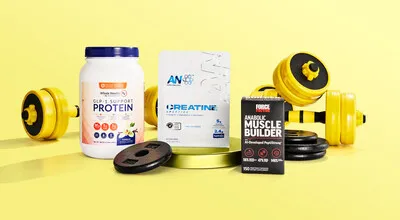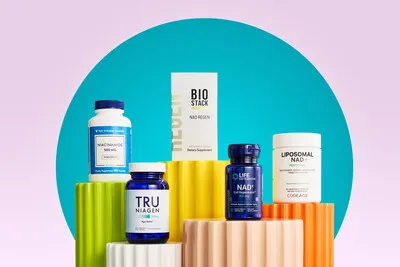In 2025, a growing number of Americans are turning to advanced longevity supplements like NAD+ boosters, peptides, and biohacking regimens in hopes of not only living longer but thriving with better health for decades. What was once a niche field reserved for biotech elites and fringe wellness communities has now gone mainstream, with clinics, e-commerce platforms, and even primary care providers offering access to cutting-edge anti-aging protocols.
The longevity movement is no longer about vanity or cosmetic youthfulness. Instead, it’s framed around cellular optimization, biological age reversal, and disease prevention—fueled by scientific discoveries and a booming health-tech market.
🧬 The Rise of NAD+ and Peptides
At the forefront of the trend are two categories of supplements: NAD+ precursors and therapeutic peptides.
NAD+ (Nicotinamide Adenine Dinucleotide)
NAD+ is a critical molecule found in every living cell, essential for energy metabolism and cellular repair. Research shows NAD+ levels decline significantly with age, potentially contributing to fatigue, DNA damage, and age-related diseases. Supplements such as NMN (Nicotinamide Mononucleotide) and NR (Nicotinamide Riboside) are designed to boost NAD+ levels, potentially slowing the aging process and supporting brain and metabolic health.
Peptides
Peptides are short chains of amino acids that signal specific functions in the body. Over 7,000 naturally occurring peptides have been identified, but synthetic variants are being used to target:
- Growth hormone production (e.g., Ipamorelin, CJC-1295)
- Tissue repair (e.g., BPC-157)
- Immune modulation
- Skin regeneration and fat loss
Their precision and adaptability make peptides a powerful tool for everything from injury recovery to enhanced cognitive function.

🔍 Why Now? The Science & Hype Converge
Three major forces have converged to bring longevity supplements to the spotlight in 2025:
- Breakthrough Research:
Understanding of cellular senescence, mitochondrial health, and epigenetic aging has improved thanks to Harvard researchers and biotech firms, suggesting that aging may be more flexible than previously thought. - Wearables and Biomarkers:
Continuous glucose monitors (CGMs), biological age clocks (such as the GrimAge model), and DNA testing allow people to monitor their internal aging and personalize interventions. - Public Interest in Health Span:
Many Americans are placing a higher value on health span—the number of years lived free from disease—than life span following the pandemic and years of health worry.
💊 What People Are Taking
Aside from NAD+ and peptides, other popular longevity supplements include:
- Resveratrol – an antioxidant often paired with NAD+ boosters
- Metformin (off-label) – used for longevity despite being a diabetes drug
- Berberine – for blood sugar regulation
- Fisetin and Quercetin – flavonoids believed to clear senescent (zombie) cells
- Rapamycin (off-label) – used in small doses to target the mTOR pathway involved in aging
Peptide therapy has grown particularly popular among athletes, executives, and aging baby boomers, many of whom swear by the improvements in energy, sleep, libido, and joint function.
🏥 Where Americans Are Getting These Supplements
- Longevity Clinics:
Bio-optimization centers like Upgrade Labs and Cenegenics offer lab testing, IV infusions, and prescription peptides. - Online Providers:
Telehealth platforms now offer peptide prescriptions after virtual consultations.Monthly longevity programs are provided by organizations such as Fountain Life, AgelessRx, and Wild Health. - DIY Biohackers:
Reddit forums, podcasts, and YouTube channels have encouraged experimentation. However, experts caution against unregulated or self-injected compounds. - Mainstream Pharmacies:
NAD+ precursors are now sold at Walgreens, CVS, and Target in capsule form, alongside adaptogens and vitamins.
⚖️ The Debate: Miracle or Marketing?
While enthusiasm for anti-aging supplements is at an all-time high, the movement is not without its skeptics.
Critics argue:
- The long-term safety of many peptides and NAD+ boosters remains unknown.
- Clinical trials are limited and often funded by supplement companies.
- Biohacking culture sometimes overpromises results not yet backed by science.
Still, early-stage research and user anecdotes suggest compelling possibilities—especially when combined with lifestyle interventions like intermittent fasting, exercise, and cold/heat therapy.
📈 The Industry Boom
The global longevity supplement market is projected to surpass $45 billion by 2027, with the U.S. leading growth. Investors are pouring capital into biotech startups, gene editing companies, and supplement brands targeting the 35+ demographic.
Silicon Valley visionaries and celebrities alike are fueling awareness. Bryan Johnson’s multimillion-dollar anti-aging protocol, Joe Rogan’s peptide use, and influencers showcasing NAD+ IV drips on TikTok have made bio-optimization aspirational.
🌎 Who’s Using These Supplements?
- Professionals in high-stress jobs using peptides to manage sleep and recovery
- Women over 40 interested in hormone-friendly anti-aging strategies
- Athletes and fitness enthusiasts targeting joint health and growth hormones
- Tech founders and longevity investors treating health like a long-term asset
According to a 2025 survey by HealthHub Insights:
- 38% of U.S. adults aged 30–55 have tried NAD+ or a peptide product in the last year.
- 62% say they would take longevity supplements “long-term” if proven safe.
🧠 The Future of Longevity in the U.S.
With AI-driven diagnostics, real-time blood biomarker tracking, and personalized gene editing on the horizon, longevity science is shifting from theory to application. While the road to reliable, regulated longevity treatments is long, public interest is only accelerating.
Whether for prevention, optimization, or experimentation, millions of Americans are no longer waiting for permission—they’re trying to reprogram aging themselves.
FAQs: Longevity Supplements & Peptides in 2025
1. What is NAD+ and why is it important for longevity?
NAD+ is a coenzyme involved in cellular energy production and DNA repair. As we age, our NAD+ levels drop, potentially leading to fatigue and cellular dysfunction. NAD+ precursors like NMN and NR aim to restore these levels and support healthy aging.
2. Are NAD+ boosters safe?
Generally, yes—but long-term studies are still underway. Most users report few side effects. However, people with cancer or pre-cancer conditions should consult a doctor, as NAD+ may fuel rapid cell turnover.
3. What are peptides and how do they work?
Peptides are short amino acid chains that send specific signals to cells. Therapeutic peptides can stimulate hormone release, promote healing, improve metabolism, or reduce inflammation. They often require prescriptions and proper dosing.
4. How do I get started with peptides or NAD+ therapy?
Start with a consultation from a longevity-focused provider. Bloodwork can determine your biological age, NAD+ levels, and inflammation markers. From there, a regimen might include oral supplements, injectables, or IV therapies.
5. Are these supplements FDA-approved?
Some NAD+ supplements are sold as dietary products and are not FDA-approved drugs. Many peptides are used off-label in the U.S. or via compounding pharmacies. Always check provider credentials and ensure sourcing is legitimate.







